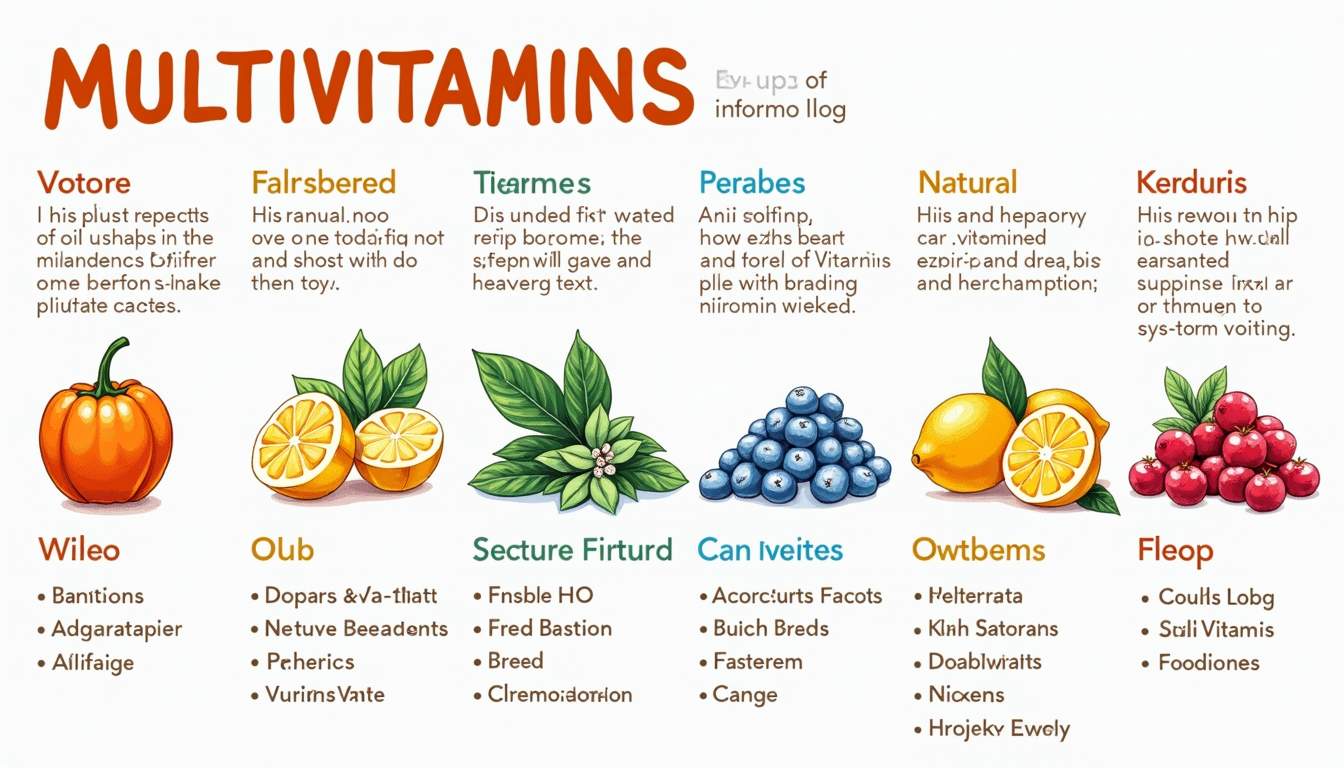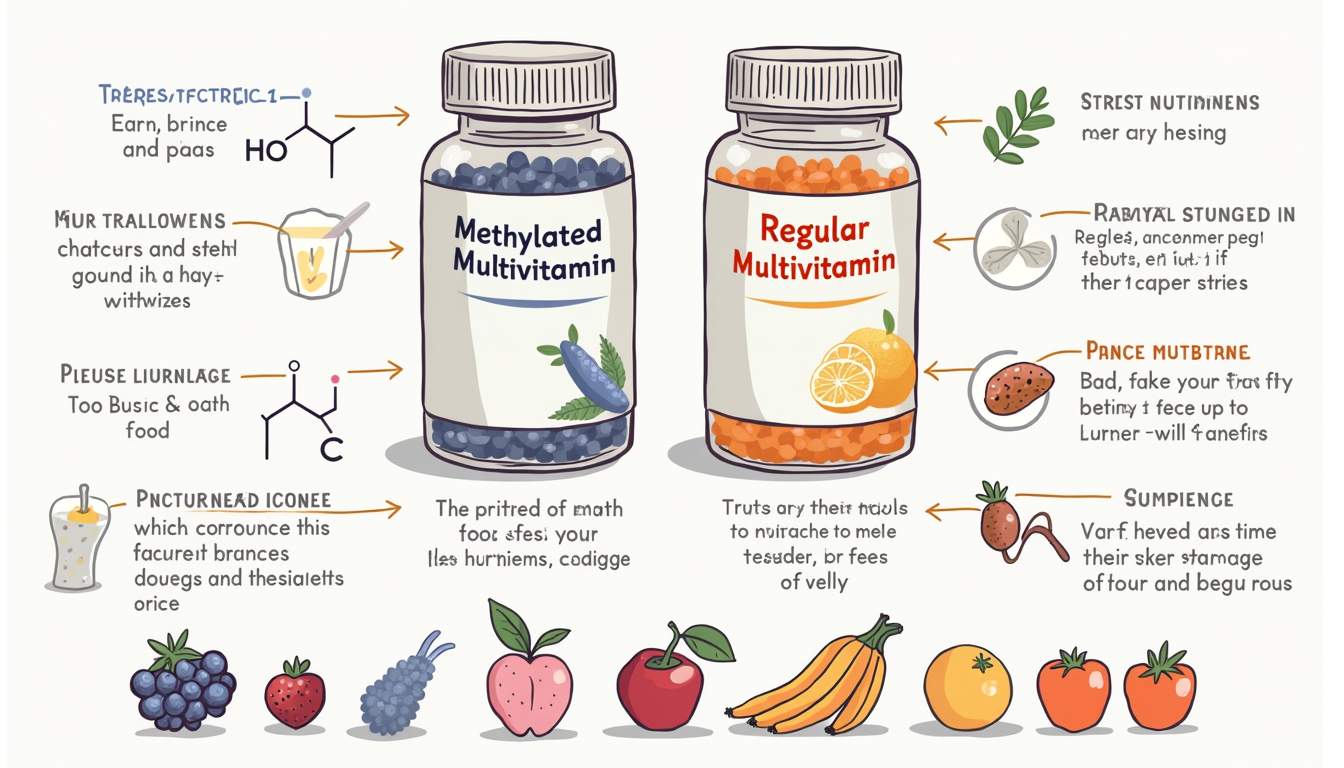Methylated multivitamins and regular multivitamins are two popular choices for individuals seeking to enhance their nutritional intake. While both types aim to support overall health, they differ significantly in their formulations and how the body processes them. Understanding these differences can help individuals make informed decisions about which supplement is best suited for their needs.
What is the difference between methylated and regular multivitamins?
Methylated multivitamins contain active forms of nutrients like B12 (methylcobalamin) and folate (5-MTHF), making them easier to absorb—especially for people with MTHFR gene mutations. Regular multivitamins use standard forms that require conversion in the body and may not be as effective for everyone.
Understanding Multivitamin Basics
What Are Regular Multivitamins and How Do They Work?
Regular multivitamins are dietary supplements that contain a combination of vitamins and minerals designed to fill nutritional gaps in a person’s diet. They typically include essential nutrients such as vitamins A, C, D, E, and various B vitamins, along with minerals like calcium, magnesium, and zinc. These supplements are formulated to support overall health and well-being.

Regular multivitamins are widely available and come in various forms, including tablets, capsules, powders, and gummies. They are often marketed for general health maintenance and are suitable for a broad audience. However, the bioavailability of certain nutrients can vary, meaning that not all individuals may absorb these vitamins and minerals effectively. For instance, some people may have digestive issues that hinder the absorption of nutrients, while others may require higher doses due to specific health conditions or lifestyle factors. It's essential for consumers to consider their unique dietary needs and consult with healthcare professionals before starting any new supplement regimen.
Moreover, the quality of multivitamins can differ significantly between brands. Some manufacturers prioritize using high-quality, bioavailable forms of vitamins and minerals, while others may include fillers or synthetic ingredients that could diminish the product's overall effectiveness. Therefore, it's advisable to research and choose reputable brands that undergo third-party testing to ensure their products meet safety and efficacy standards.
How Methylated Multivitamins Support Nutrient Absorption
Methylated multivitamins, on the other hand, are specifically formulated to include nutrients in their methylated forms. Methylation is a biochemical process that involves the addition of a methyl group to a molecule, which can enhance the bioavailability of certain vitamins. The most notable methylated vitamins include methylcobalamin (a form of vitamin B12) and methylfolate (the active form of folate).
These supplements are particularly beneficial for individuals with specific genetic variations, such as those affecting the MTHFR gene, which can hinder the body’s ability to convert regular folic acid into its active form. Methylated multivitamins aim to provide these individuals with the nutrients they need in a form that their bodies can readily utilize. This is crucial not only for general health but also for processes such as DNA synthesis, neurotransmitter production, and detoxification, which rely heavily on proper methylation.
In addition to genetic considerations, methylated multivitamins may also appeal to those with certain dietary restrictions or preferences, such as vegetarians and vegans, who might struggle to obtain adequate levels of specific nutrients from food alone. By providing these nutrients in their bioactive forms, methylated multivitamins can help bridge the gap for those who may be at risk of deficiencies due to dietary choices. As awareness of the importance of personalized nutrition grows, methylated multivitamins are becoming an increasingly popular choice among health-conscious consumers looking to optimize their nutrient intake.
The Science of Methylation
The MTHFR Gene and Methylation Process
The MTHFR gene encodes an enzyme that plays a crucial role in the methylation process. This enzyme is responsible for converting folate into its active form, which is essential for DNA synthesis, repair, and overall cellular function. Variations in the MTHFR gene can lead to reduced enzyme activity, making it difficult for some individuals to process folic acid effectively.
Individuals with MTHFR mutations may experience a range of health issues, including elevated homocysteine levels, which are associated with cardiovascular disease and other health concerns. Methylated vitamins provide a solution by supplying the body with nutrients in a form that bypasses the need for conversion, thereby supporting those who may struggle with methylation.
In addition to cardiovascular implications, the impact of MTHFR mutations can extend to mental health as well. Research suggests that individuals with these mutations may be at a higher risk for mood disorders, including depression and anxiety. This connection underscores the importance of methylation in neurotransmitter synthesis, particularly serotonin and dopamine, which are critical for mood regulation. By ensuring adequate levels of active folate through methylated vitamins, individuals may find a pathway to improved mental well-being.
How Methylated Vitamins Are Processed in the Body
Methylated vitamins are absorbed more efficiently than their non-methylated counterparts. When ingested, these vitamins enter the bloodstream and are readily utilized by the body without the need for additional conversion. This is particularly important for individuals with compromised methylation pathways, as it ensures they receive the full benefits of the vitamins they consume.
Moreover, methylated vitamins can support various bodily functions, including neurotransmitter production, detoxification, and the maintenance of healthy homocysteine levels. This enhanced processing capability makes methylated multivitamins an attractive option for those seeking optimal health and wellness. Furthermore, the role of methylation extends beyond vitamins; it is also involved in the regulation of gene expression and the metabolism of hormones. This means that adequate methylation can influence everything from stress response to reproductive health, highlighting the far-reaching implications of this biochemical process.
Additionally, the bioavailability of methylated vitamins can vary based on individual dietary habits and gut health. A diet rich in whole foods, particularly leafy greens and legumes, can support natural folate levels, while a compromised gut may hinder absorption. Therefore, understanding one's unique health profile and potential MTHFR mutations can empower individuals to make informed choices about their supplementation and dietary strategies, ultimately leading to enhanced overall health and vitality.
Choosing the Right Multivitamin for You
Who Should Take Methylated Multivitamins?
Methylated multivitamins are especially beneficial for individuals with MTHFR gene mutations or other genetic variations that affect methylation. These individuals may experience fatigue, mood disorders, and other symptoms related to poor nutrient absorption. By choosing a methylated multivitamin, they can ensure their bodies receive the necessary nutrients in an easily accessible form.

Additionally, pregnant women and individuals planning to conceive may also benefit from methylated vitamins. Methylfolate is crucial for fetal development, and using a methylated form can help reduce the risk of neural tube defects and other complications. Furthermore, anyone with a history of cardiovascular issues or elevated homocysteine levels should consider methylated multivitamins as part of their health regimen. Beyond these groups, those with chronic stress or high levels of inflammation may find that methylated vitamins support their overall health by enhancing energy levels and improving mood stability.
Moreover, individuals following a vegan or vegetarian diet might also find methylated multivitamins particularly beneficial. These diets can sometimes lack sufficient levels of certain B vitamins, especially B12 and folate, which are crucial for energy production and cellular function. Methylated forms of these vitamins can help bridge the nutritional gaps that may arise from dietary restrictions, ensuring that individuals receive adequate amounts of these essential nutrients for optimal health.
Are Methylated Multivitamins Worth the Cost?
When it comes to cost, methylated multivitamins are often priced higher than regular multivitamins due to their specialized formulations and the additional processing required to create them. However, the potential health benefits they offer may justify the higher price for many individuals, particularly those with specific health concerns related to methylation. It’s worth noting that some health insurance plans may cover the cost of these supplements if prescribed by a healthcare provider, making them more accessible for those in need.
Availability can also vary. While regular multivitamins are widely found in pharmacies, grocery stores, and online, methylated multivitamins may be more commonly found in health food stores or specialized online retailers. It’s essential to research and choose reputable brands that provide high-quality methylated vitamins to ensure efficacy and safety. Additionally, reading customer reviews and checking for third-party testing can help consumers make informed choices, ensuring they select products that meet their specific health requirements. As the demand for methylated options continues to grow, more retailers are beginning to stock these specialized vitamins, making it easier for consumers to find what they need.
In conclusion, understanding the differences between methylated and regular multivitamins can empower individuals to make informed choices about their nutritional needs. While regular multivitamins serve a broad audience, those with specific genetic considerations may find greater benefit from methylated options, ultimately supporting their overall health and well-being.
Looking for a High-Quality Methylated Multivitamin?
Our Methylated Multivitamin is ideal for those with MTHFR mutations or anyone looking for better absorption and energy.
-
Includes methylfolate, methylcobalamin, and active B6
-
Supports energy, detoxification, mood, and metabolism
-
Made for those who care about optimal health
Shop Methylated Multivitamins Now
Frequently Asked Questions
Q: Do I need a methylated multivitamin if I don’t have MTHFR?
A: Even without the mutation, many people benefit from better absorption and energy support that methylated vitamins offer.
Q: What’s the main advantage of methylated multivitamins?
A: They contain nutrients in their active forms, which means your body can use them immediately without converting them.
Q: Are methylated multivitamins safe for long-term use?
A: Yes, when taken as directed. Consult your healthcare provider before starting any new supplement

Share:
Methylated Vitamins for Women: Benefits, Dosage, and When to Take Them
Ashwagandha Duration Guide: How Long to Use for Stress Relief, Sleep, and Hormonal Balance